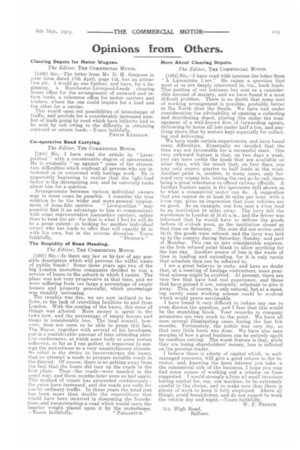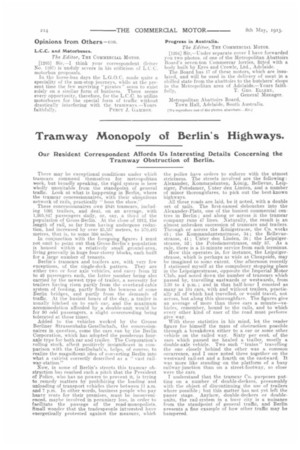Opinions from Others.
Page 21

Page 22

If you've noticed an error in this article please click here to report it so we can fix it.
Clearing Depots for Motor Wagons.
The Editor, THE COMMERCIAL MOTOR.
[1199] Sir,—The letter from Mr. D. H. Simpson in your issue dated 17th April, page 142, has an. attractive air. I would go one further, and have, for a beginning, a Manchester-Liverpool-Leeds clearing house office for the arrangement of outward and return loads, a reference office for motor carriers and traders, where the one could inquire for a load arid the other for a carrier.
This would open out possibilities of interchange of traffic, and provide for a considerably increased number of loads going by road which have hitherto had to be sent by rail owing to the difficulty in obtaining outward or return loads.—Yours faithfully,
PHILIP K ERS HAW.
Co-operative Road Carrying, The Editor, THE COMMERCIAL MOTOR.
[1200] Sir, —I have read the article by " Liver-. pudlian " with a considerable degree of amusement. He is evidently " up against" some of the elementary difficulties which confront all persons who are interested in or concerned with haulage work. He is apparently beginning to realize that the light-load factor is the determining one, and he naturally looks about him for a solution.
Arrangements between various individual owners may in some cases be possible. I consider the true solution to be the wider and more-general employ ment of bona-fide carriers. " Liverpudlian " may possibly find it an advantage to him to communicate with some representative Lancashire carriers, rather than to beat the air—for that is what I feel he will do to a great extent—in looking for another individual owner who has loads to offer that will exactly fit in with his own, but in the reverse direction.-Yours
faithfully, "DUBIOUS."
The Stupidity of Road Mending.
The Editor, THE COMMERCIAL MOTOR.
[1201] Sir,—Is there any law or by-law of any possible description which will prevent the wilful waste of public funds ? Some three years ago two of the big London motorbus companies decided to run a service of buses to the suburb in which I reside. The place was not very progressive at that time, and we were suffering from too large a percentage of empty houses and property generally, which percentage was steadily increasing.
The trouble was due, we are now inclined to believe, to the lack of travelling facilities to and from London. With the coming of the buses, this state of things was altered. More money is spent in the town now, and the percentage of empty houses and shops is considerably less. The local oouncil, however, does not seem to be able to grasp this fact. The Mayor, together with several of his henchmen, put in a considerable amount of time attending abortive conferences, at which some body or some person unknown, so far as I can gather, is requested to consign the motorbuses to a very unsatisfactory climate. So rabid is the desire to inconvenience the buses, that no attempt is made to prepare suitable roads in the district. Of course, there is no getting away from the fact that the buses did tear up the roads in the first place. They—the roads—were mended in the usual way, and three months later were as bad again. This method of repair has proceeded continuously ; the rates have increased, and the roads are unfit for Itse by ordinary traffic. In three years the total cost has been more than double the expendil tire thst would have been incurred in deepening the foundations and reconstructing a road which would carry the heavier weight placed upon it by the motorbuses.
—Yours faithfully, " PALLADIUM. " More About Clearing Depots.
The Editor, THE COMMERCIAL MOTOR.
[1202] Sir,—I have read with interest the letter from "A Lancashire User." He raises a question that most of us are deeply interested in, viz., back loads. This portion of our business has cost us a considerable amount of anxiety, and we have found it a most difficult problem. There is no doubt that some sort of working arrangement is possible, probably better in the North than the South. We have had under consideration the advisability of opening a collecting and distributing depot, placing this under the management of a well-known firm of forwarding agents, delivering by horse all lots under half a ton, and anything above that by motors kept especially for collecting and delivering.
We have made certain experiments, and have found many difficulties. Eventually we decided that the time was not favourable for a successful start. One very awkward feature is that, on two days a week, you can have 'treble the loads that are available on other days, with the result that, on four days, you may only expect quarter to half loads at the most. Another point is, senders, in many cases, only forward very urgent lots, letting the rest go by rail, there being a great reluctance to offend railway officials, A further feature again is the ignorance still shown as to what a commercial motor can do. A suggestion that you cannot do at least 25 miles per hour, with a 4-ton van, gives an impression that your vehicles are no good. As an example, one firm sent a 4-ton load to an institution 34 miles away. The lorry left the warehouse in London at 10.45 a.m., and the driver was informed that he would have to deliver the goods before 12 o'clock noon, as the institution closed at that time on Saturday. The man did not arrive until 12.45, the goods were refused, and the lorry was laid up in the country during Saturday, Sunday, and part of Monday. This ran us into considerable expense, as the firm refused point blank to allow anything for the lost day. Another source of loss is the waste of time in loading and unloading, for it is only rarely that schedule time can be adhered to.
I am a great believer in unity, and have no doubt that, at a meeting of haulage contractors, some practical scheme might be evolved. At present, there are very few that have had real experience, and those that have gained it are, naturally, reluctant to give it away. This, of course, is only natural, but at a meeting surely some working scheme could be evolved which would prove serviceable.
I have found it very difficult to induce any one to even discuss the question, and I fear that this would be the stumbling block. Your remarks re company promoters are very much to the point. We have all seen several illuminating cases during the last few months. Fortunately, the public was very shy, so that very little harm was done. We have also seen samples of how a good business can be entirely spoilt by needless cutting. The worst feature is that, while they are losing shareholders' money, loss is inflicted on the genuine trader.
I believe there is plenty of capital which, in wellmanaged concerns, will give a good return to the investor, and, knowing the keen interest you take In the commercial side of the business, I hope you may find some means of working out a scheme on lines suggested. I would strongly alvise all small investors having capital for, say, one machine, to be extremely careful in the choice, and to make sure that there is plenty of work to keep it fully employed. Above all things, avoid breakdowns, and do riot expect to work the vehicle day and night.—Yours faithfully, W. F. FRENCH. 314, High Road, L.C.C. and Motorbuses.
The Editor, THE COMMERCIAL MOTOR.
[1203] Sir,—I think your correspondent. (letter No. 1197) is unduly severe in. his criticism of L.C.U. motorbus proposals.
In the horse-bus days the L.G.O.C. made quite a speciality of the non-stop journeys, while at the present time the few surviving "pirates" seem to exist solely on a similar form of business. There seems every opportunity, therefore, for the L.C.C. to utilize motorbuses for the special form of traffic without drastically interfering with the tramways.—Yours faithfully, PF.ROY J. GAMMON. Progress in Australia.
The Editor, LIE COMMERCIAL MOTOR.
[1204] Sir,—Under separate cover I have forwarded you two photos. of one of the Metropolitan Abattoirs Board's seven-ton Commercar lorries, fitted with a body built by Eyes and Crowle, Ltd., Adelaide.
The Board has 17 of these motors, which are insulated, and will be used in the delivery of meat in a chilled state from the abattoirs to the butchers' shops in the Metropolitan area of Adelaide.—Yours 1'. Go. ELLERY, General Manager.
Metropolitan Abattoirs Board, Town Hall, Adelaide, South Australia.
[We reproduce one of the photos. elsewhere.._EP.]


























